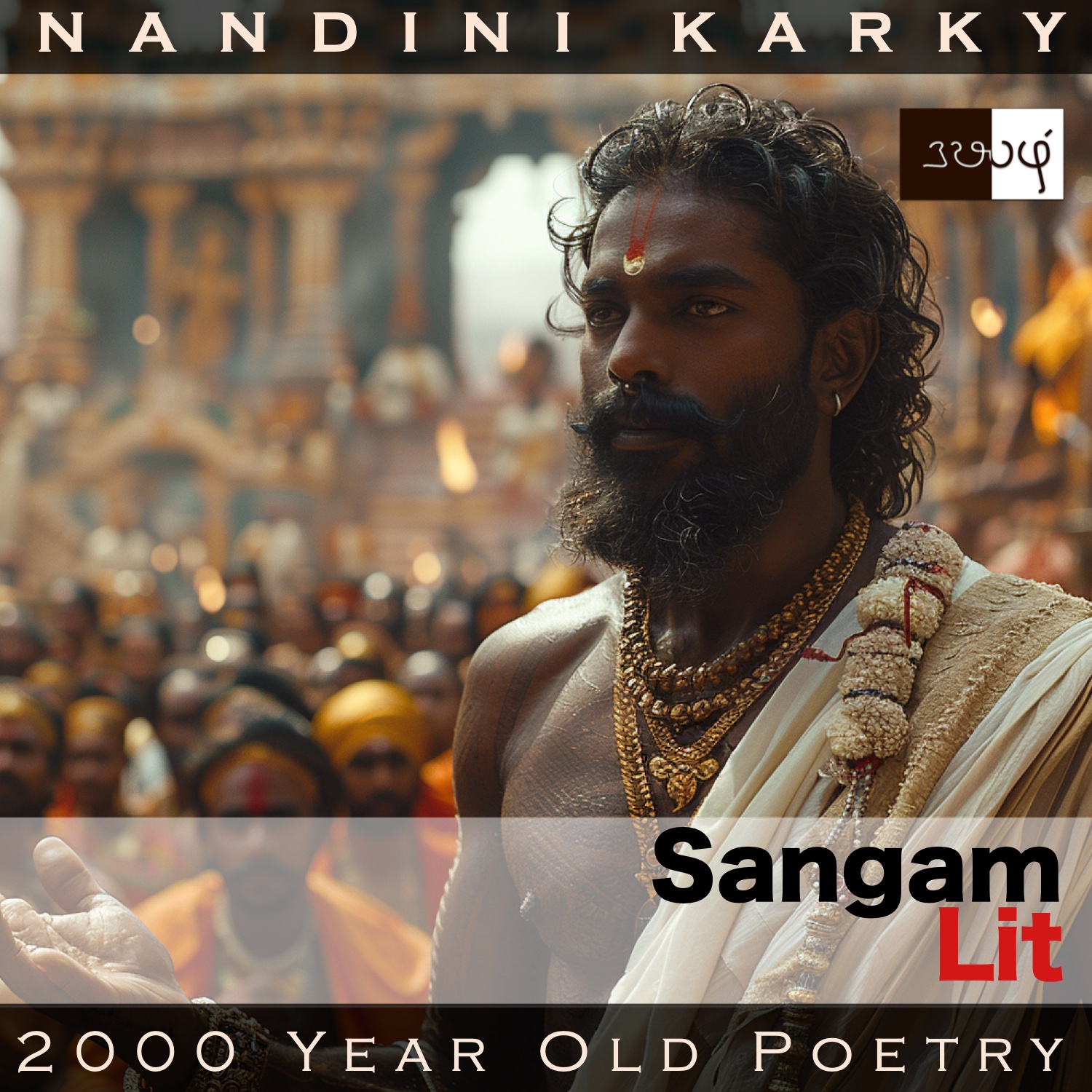Podcast: Play in new window | Download
Subscribe: Apple Podcasts | Spotify | Amazon Music | Android | iHeartRadio | TuneIn | RSS | More
In this episode, we listen to words rendered unto Death, as depicted in Sangam Literary work, Puranaanooru 361, penned by the poet Kayamanaar. Set in an unidentified category, the verse talks about the qualities of a leader.

கார் எதிர் உருமின் உரறி, கல்லென,
ஆர் உயிர்க்கு அலமரும் ஆராக் கூற்றம்!
நின் வரவு அஞ்சலன் மாதோ; நன் பல
கேள்வி முற்றிய வேள்வி அந்தணர்க்கு,
அருங் கலம் நீரொடு சிதறி, பெருந்தகைத்
தாயின் நன்று பலர்க்கு ஈத்து,
தெருள் நடை மா களிறொடு தன்
அருள் பாடுநர்க்கு நன்கு அருளியும்,
உருள் நடைப் பஃறேர் ஒன்னார்க் கொன்று தன்
தாள் சேருநர்க்கு இனிது ஈத்தும்,
புரி மாலையர் பாடினிக்குப்
பொலந் தாமரைப் பூம் பாணரொடு
கலந்து அளைஇய நீள் இருக்கையால்
பொறையொடு மலிந்த கற்பின் மான் நோக்கின்,
வில் என விலங்கிய புருவத்து, வல்லென
நல்கின் நா அஞ்சும் முள் எயிற்று, மகளிர்
அல்குல் தாங்கா அசைஇ, மெல்லென
கலங்கலந் தேறல் பொலங்கலத்து ஏந்தி,
அமிழ்து என மடுப்ப மாந்தி, இகழ்விலன்,
நில்லா உலகத்து நிலையாமை நீ
சொல்ல வேண்டா தோன்றல் முந்து அறிந்த
முழுது உணர் கேள்வியன் ஆகலின்…….
…………………………………………விரகினானே
A song which praises an unknown king to the skies in words to death which comes for him. The poet’s words can be translated as follows:
“Appearing suddenly like the monsoon’s thunder, you rove restlessly to devour lives, O unsatisfied Death! He is not one to fear your approach. To priests with deep knowledge, he has rendered precious vessels filled with water, and with a generosity even greater than that of a mother, he has rendered to many. He has showered swift-gaited horses along with elephants to those who sing of his glory, and joyfully rendered many rolling chariots to those who kill his enemies and surrender at his feet. Garlands for the female singers and golden lotuses to bards, he has given.
In his great seat of power, where he remains relaxed, maiden with patience and virtue, with deer-like gazes, with arching eyebrows akin to bows, having sharp teeth that the tongue is scared of, with swaying waists, gently bring filtered toddy in golden vessels. Even when they render unto him as if it were elixir, he does not forget the impermanence of this unstopping world. And so, you don’t have to tell him about it, since he is someone who has assimilated all the knowledge and so…”
Let’s delve into the details. The poet makes it clear to us that he’s addressing Death, which appears suddenly like the sound of thunder during the rains. He then boasts to this fearsome entity that the leader it comes for, is not afraid of it, and then goes on to say how he’s been generous to everyone, be it the priests, poets, female singers, bards, and lords who fight for him. More than a mother’s, is his generosity, glorifies the poet. The leader is not all work and no play for when he is relaxed in his place, his royal maiden bring him exquisite toddy in golden vessels and he enjoys them as if it’s nectar from the heavens. Even so, the man doesn’t forget about the impermanence of it all, the poet adds. He then concludes with words to Death that there’s nothing it needs to educate him about as he has acquired all the knowledge that there is.
A verse which made me wonder what is the point of this! Death is not going to cease and go away because of these words spoken. Then I thought maybe the poet considers this as a creative way of praising this leader, and in any case, it’s the same old praise for being generous and giving away everything to everybody. Finally, the one thing that remained strong in the end is the understanding of impermanence that this leader seems to have. That nothing lasts and everything changes is the one universal and timeless truth we can accept from this ancient verse.




Share your thoughts...